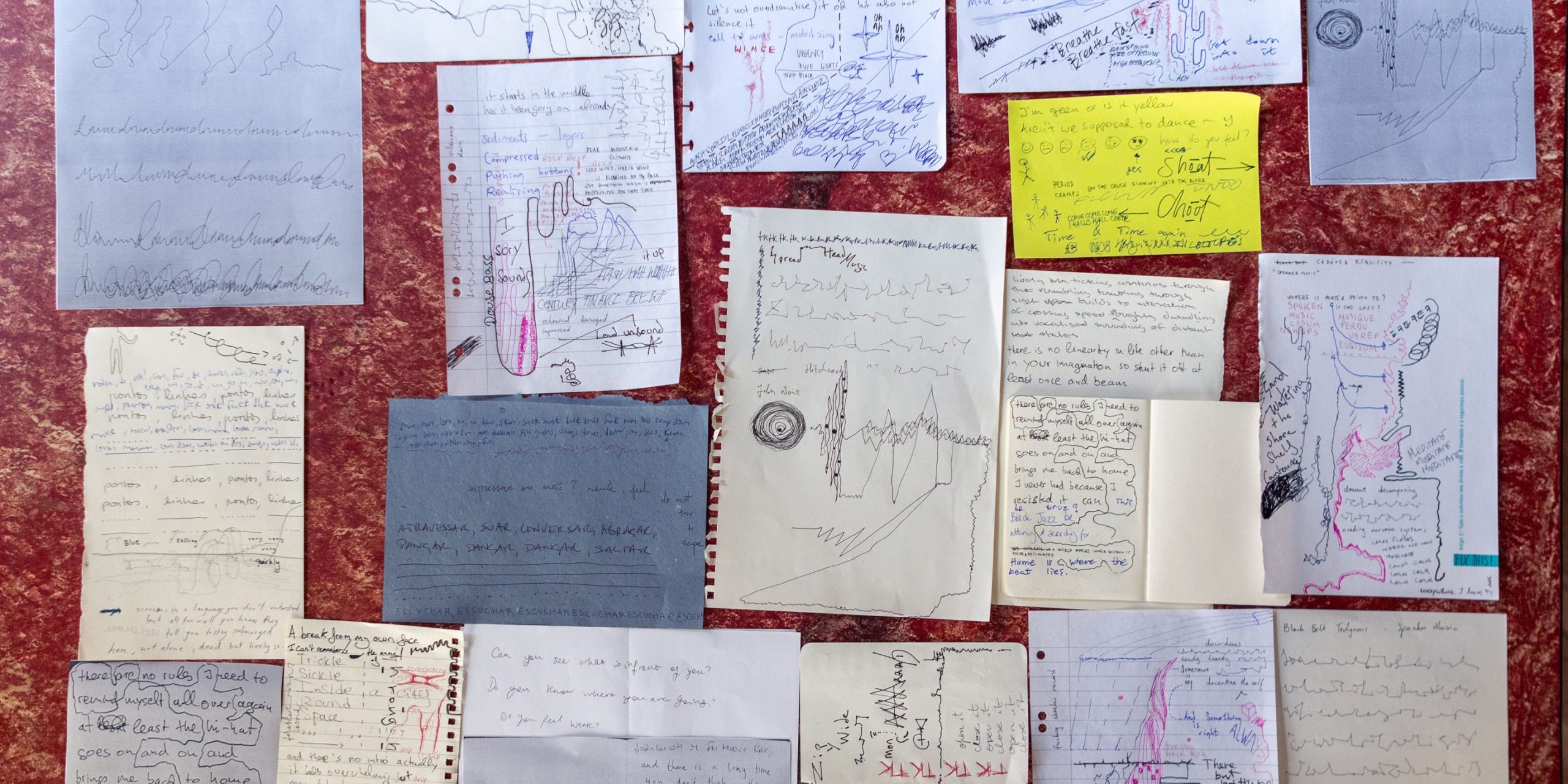At Summer University 2023 at PAF in France, I and filmmaker Eavan Aiken held the three-day workshop Sonic Worlding. It is loosely based on the Norient column with the same title. The first part of the workshop implied writing an essay collectively loosely inspired by the style of an exquisite corpse, a method by which a text is collectively assembled by passing it on to their neighbour after 45 seconds. The contributors could choose between semantic and asemic writing. The essay was created while listening to the track Black Belt Techgnosis by the musician, writer of the book Assembling a Black Counter Culture, and activist DeForrest Brown Jr aka Speaker Music. The track, composed as a collaboration with Victoria Shen at Canary Test, can be found here.
The following questions served as loose prompts.
How to make texts that tell new stories about the world in which thinking does not derive its concepts from “verified knowledge”?
How to bypass the usual jump-cut of relating phenomena to overarching systems (capitalism, climate change) and instead focus on ordinary, fragmented experiences of everyday life as an integral site of cultural politics?
How to write WITH music & sound rather than ABOUT?
What happens if music is listening/sensing back at you?
What happens if you don’t filter out your internal and external noise?
Collective Essay
Read from left to right.
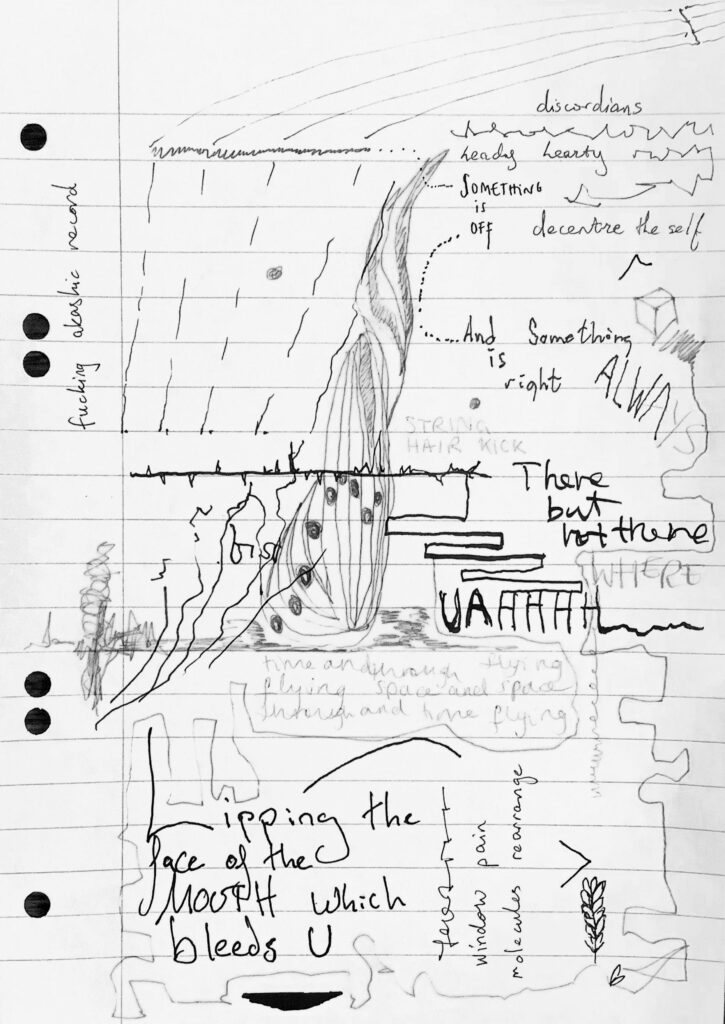
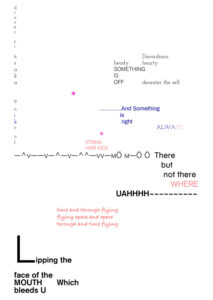
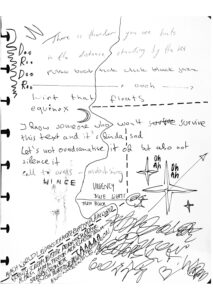
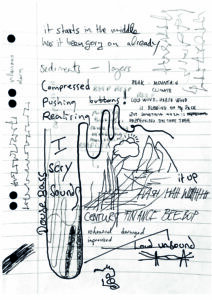
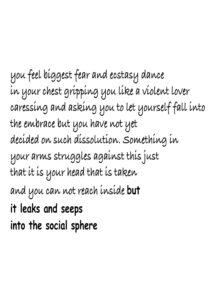

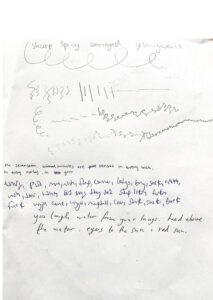

Authors: Joana Amen, Linda Elsner, Teresa, Liam Alzafari, Ashley Holmes, Carina Erdman, Helena Oliveira, Teresa, Joey, Rita Serra Silva, Eavan Aiken, Philipp Rhensius, Nathaniel.
Writing Inspiration
We write to what’s becoming palpable in sidelong looks or a consistency of rhythm or tone. Not to drag things back to the land of the little judges but to push the slow-mo button, to wait for what’s starting up, to listen up for what’s wearing out. We’re tripwired by a tendency dilating. […] Words sediment next to something laid low, or they detour on a crazed thought-cell taking off.
[Lauren Berlant & Kathleen Stewart: „The Hundreds“]
How do we cultivate a language that perceives in modes other than identification and assignation? How, in prose (and I specify prose because poetry has a much easier time of dislodging objects from their categorical existences)—so, how in prose, in that gathering of sentences can we position ourselves as adventurers (not unlike translators) of space?
[Renee Gladman interviewed by Kate Briggs]
I was really pleased to find an old essay by Sylvere Lothringer which explained how they wanted people to use Semiotexte books for speculative acceleration. Instead, people started using these text to prove their moral superiority, saying “You are wrong, you have misunderstood Foucault.” They used theory for prestige, to block speculation. That is why so many artists used to resent theory. You would get these lame pieces, somebody trying to apply Heidegger to Parliament-Funkadelic because they had seen the word “ontology” on a cover, instead of taking Parliament to read Heidegger. They always did it the other way round. Theory wasn’t being used to pluralize, to see that there was theory everywhere you looked, and everywhere you listened.
[Kodwo Eshun interviewed by Geert Lovink]
The leaning against I’m talking about takes place on a horizontal plane of action, not a vertical one. It brings one into the land of wild associations, rather than that of grim congenital lineage. It is a place, as Gertrude Stein would have it, in which “the difference is spreading.
[Maggie Nelson: „Writing With, From, and For Others“]
